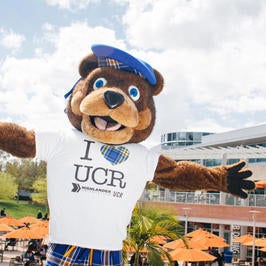Overview
The Neuroscience major is an intercollege major offered by the College of Natural and Agricultural Sciences and the College of Humanities, Arts, and Social Sciences. As an interdepartmental, cross-college program, the major offers access to more than 40 faculty from the departments of Molecular, Cellular and Systems Biology (MCSB; formerly Cell Biology and Neuroscience); Psychology; Biomedical Sciences; Evolution, Ecology and Organismal Biology (EEOB; formerly Biology); Entomology; Bioengineering and Chemistry.
The interdepartmental structure of the major provides our students with excellent and diverse opportunities for training in classes and in research. Research interests of faculty in the major include molecular, cellular, systems and behavioral approaches. There are also numerous multi-faculty research groups, including interests in glial-neuronal interactions (through the Center for Glia-Neuronal Interactions), neurodevelopmental disorders, cortical processes and plasticity, neuroinflammation, and gut-brain interactions. The program strives for excellence in research, teaching, and public service, and members of our faculty have been recognized in each of these areas, including as Fellows of the American Association for the Advancement of Science. Several have received awards for teaching, including the Academic Senate’s Distinguished Teaching Award, the Innovative Teaching Award, and the Distinguished Campus Service Award, and awards for excellence in undergraduate mentoring.
Neuroscience Advising
Click on the drop-menus below for more information and documents related to the Neuroscience major.
-
Change of Major Criteria for Neuroscience
Student must be in good academic standing (quarter and cumulative GPAs at 2.0 and above) to declare a major. Neuroscience Core GPA must be 2.0 or higher with no grades lower than a C- in any attempted Core or Tier 1 course. If upper-division courses have been taken, a minimum upper-division GPA of a 2.0 is required. Must be able to complete the degree within 216 units. AP/IB units or transfer units earned prior to graduating high school are excluded when determining unit range for change of major criteria and 216 unit maximum. Freshman (up to 44.9 units)
Sophomore (45 - 89.9 units)
Junior (90 - 134.9 units)
Senior (135 units & above)
Completion of...
- MATH 006B
- MATH007A/MATH 009A
- CHEM 001A/CHEM 01LA
- CHEM001B/CHEM 01LB
Completion of all previously listed criteria and the following courses:
- MATH007B/MATH 009B
- CHEM 001C
- CHEM 01LC
- BIOL 005A/BIOL 05LA or BIOL 020
- BIOL005B
Completion of all previously listed criteria and the following courses:
- BIOL005C
- Completion of at least one of the following sequences with no grade lower than a C-
- CHEM 008A
- CHEM 08LA
- CHEM 008B
- CHEM 08LB
- CHEM 008C
- CHEM 08LC
- PHYS 002A
- PHYS 02LA
- PHYS 002B
- PHYS 02LB
- PHYS 002C
- PHYS 02LC
Completion of all previously listed criteria and the following courses:
- BCH 100 or BCH 110A
- CBNS 106
- STAT 004 or *STAT010 or PSYC 011
*STAT100A accepted if taken prior to Fall 2021
-
Additional Information about the Neuroscience Major
Neuroscience Additional Documents
-
Course Planning Materials for Neuroscience
Neuroscience Degree Summary Sheets
Neuroscience Sample Four-Year Course Plans
Neuroscience Schedule of Course Offerings
-
Neuroscience Minor
To declare a minor, students must: be in good academic standing (quarter and cumulative GPAs at 2.0 and above); complete 2 upper-division courses required for the minor with a C or better; and be able to complete both your major and minor within the 216 unit maximum. *AP/IB units or transfer units earned prior to graduating high school are excluded when determining 216 unit maximum. Minors must be declared no later than 2 quarters prior to a student's expected graduation term. A minimum of 16 upper-division units must be unique to the minor; additional upper-division units beyond those unique 16 may also be used toward major requirements if applicable. Neuroscience Minor Requirements
-
First Tier (13-14 units)
- CBNS 106 with a grade of C- or better
- CBNS 120/PSYC 120
- CBNS 120L/PSYC 120L or PSYC122L or CBNS130L/PSYC123L
- CBNS 124/PSYC 124
-
Second Tier (6-7 units)
Select additional units from the list below so that the units from the First Tier combined with the units from the Second Tier equal at least 20.- BIOL 178; CBNS 101, CBNS 116, CBNS 121/ PSYC 121, PSYC 122, CBNS 125/PSYC 125, CBNS 126/PSYC 126, CBNS 127/PSYC 127; PSYC 112, PSYC 117, PSYC 129
-
Neuroscience Academic Advisors
CNAS Professional Academic Advisors provide students with individual guidance throughout their academic careers at UCR and help them achieve realistic academic goals. Professional Academic Advisors can assist you with declaring or changing your major or minor, course repeats, the process for taking courses outside of UCR, taking a leave from UCR, and questions about withdrawing or readmitting to UCR.
Neuroscience Lead Faculty Advisor
A Lead Faculty Advisor is assigned for each major. Faculty advisors are available to assist students with guidance regarding graduate or professional school, opportunities to participate in research, independent study, or internships. Faculty advisors also may provide students with advice and mentoring regarding career goals.




